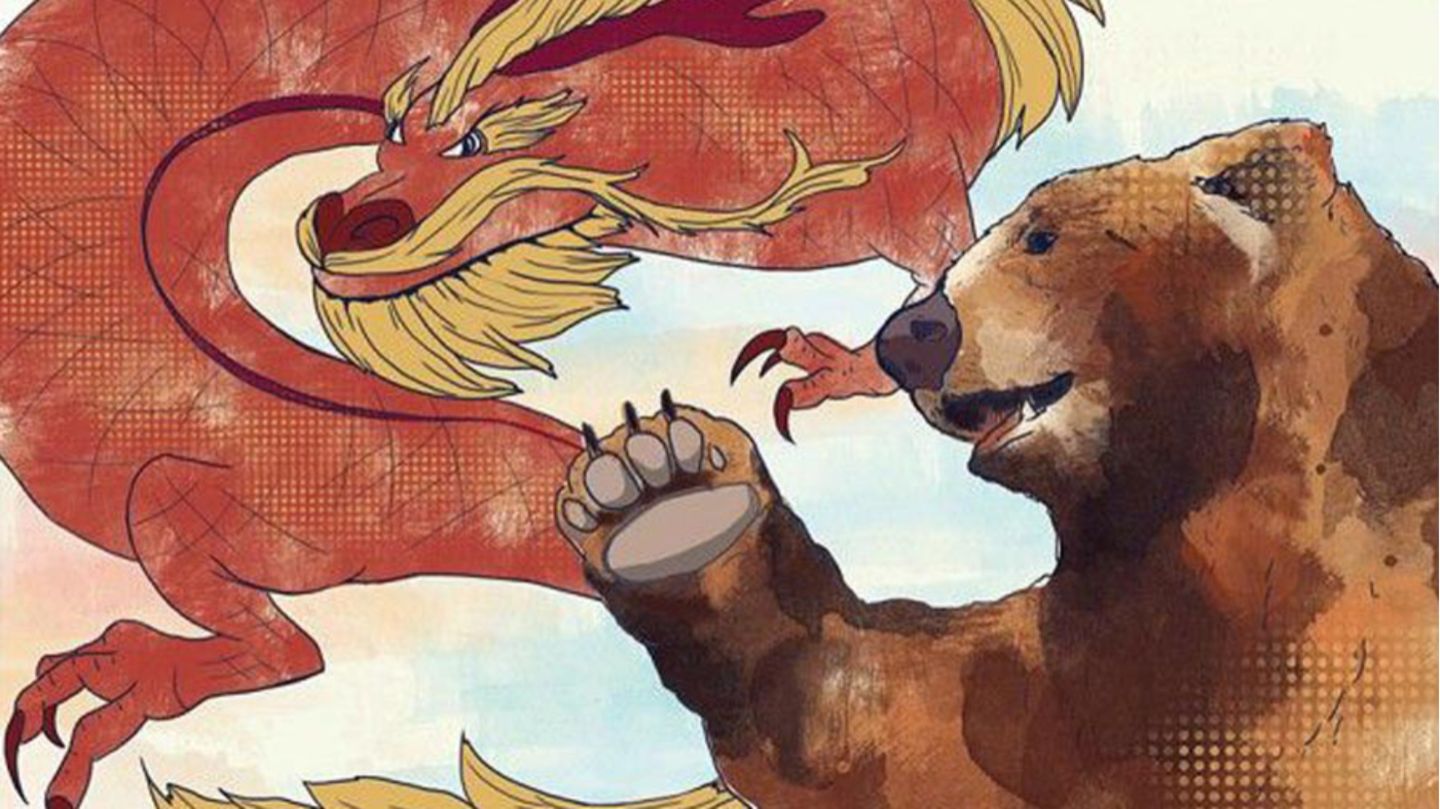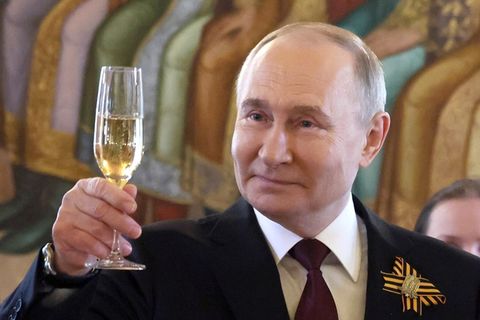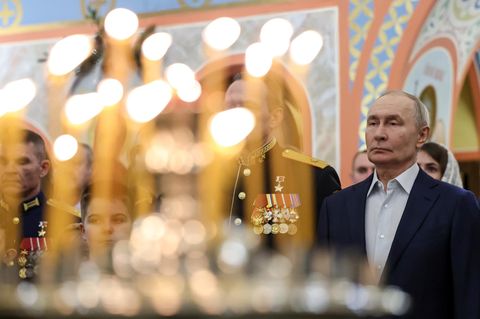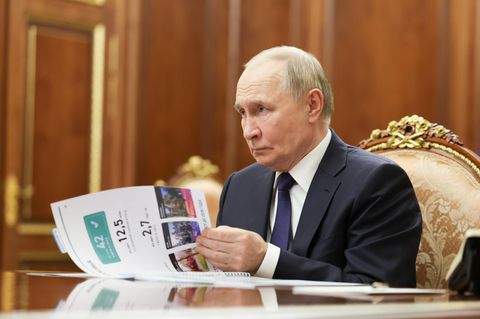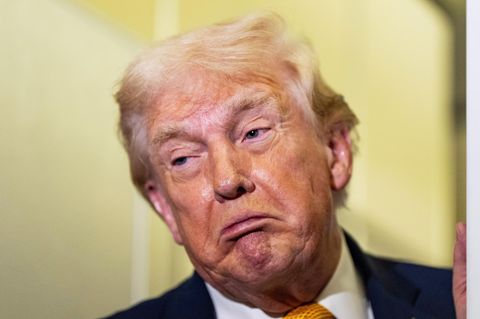Ms. Tchakarova, Russia wants to be recognized as a great power. The West denies Russia this status, and what is China's position?
China is clearly the stronger partner economically, but it treats Russia as an equal rather than a subordinate partner. Mutual respect plays an exceedingly important role in this bilateral relationship, in which the two presidents have met thirty-eight times. It is important to remember, that this is an asymmetrical relationship in which China has trade, economic, and financial dominance, while Russia continues to have defense and, in many respects, diplomatic superiority through its regional power projection and successful military operations.
Even earlier, Russia was described as "Asian," not really belonging to Europe. At that time, this was mainly meant in a pejorative way. Asian meant cruel, despotic and backward. Today, Europe is no longer the center of the world; the focus is shifting to Asia. What does this mean for Russia's orientation?
Europe is increasingly becoming the geopolitical backyard of international politics. The military escalation by Russia along the Ukrainian border has in turn brought to light the geopolitical irrelevance of the European powers, especially Germany and France, as they are unable to prevent a military attack by Russia in their immediate neighborhood. While their diplomatic efforts are not unimportant, they are of secondary importance because the Russian president targeted the U.S. response since the military escalation against Ukraine began.
Russia's geostrategic approach actually pursues a vertical (north-south) extension of its geopolitical and geoeconomic interests, encompassing the Arctic Ocean and the Barents Sea, spanning its "near abroad" in Eastern Europe and the South Caucasus, and reaching into Eurasia, the Middle East, and North Africa. The western flank, which is the eastern flank for NATO's European members, remains one of the most important geostrategic hotspots because of the concentration of Russian population in this area. Russia is slowly but surely shifting its focus to Eurasia (Central Asia, South Caucasus, and Eastern Europe), South Asia (India, Pakistan, Afghanistan), and the Indo-Pacific region. For this reason, the Russian president wants to negotiate the security guarantees for Russia's "sphere of influence" as well as the future of the European Security Architecture with the U.S. at present, so that he can increasingly focus on the new geopolitical and geo-economic terrains.
Compared to the rising China, Russia will always be only the small junior partner. To what extent is this compatible with Moscow's self-image?
Russia needs a powerful ally because of its isolation in the West, while China needs a reliable junior partner with regional power projection to strengthen its international influence. The extent to which this relationship will deepen depends on China's continued economic rise. It is in the interest of both countries to project to the outside world the impression of a stable and resilient alliance against the West. However, there are currently no clear signals of a defense alliance between the two powers. The rapprochement appears to be more tactical than strategic. Even maintaining the status quo would probably be acceptable to both states as long as China's rise does not pose a direct threat to Russia's strategic interests within its own geographic sphere of influence.
Beijing needs Russia to project its power in Eurasia?
Moscow benefits from China's terrestrial overstretch that connects Asia and Europe across the Eurasian landmass. Moreover, the Chinese Silk Road embodies a horizontal geopolitical expanse that stretches from the western parts of China to Europe, diverting China's attention from Russia's Far East while underscoring the need for Russia's role in filling geopolitical gaps in Central Asia, the Middle East, and East Africa. South Asia is the geographic space where Moscow is helping Beijing stabilize Afghanistan and prevent negative effects of terrorism on Kazakhstan, Tajikistan, Uzbekistan, and Turkmenistan. Building bridges between Afghanistan, Pakistan, and Iran is beneficial to Russian interests. Moscow is emerging as a valuable security provider critical to China's geo-economic interests in these regions. Given the systemic confrontation between the U.S. and China, Russia could play an indispensable role as a global mercenary power for China's geo-economic interests in Asia and Africa in the future.
Dragon-Bear sounds scary, German Drachenbär sounds a bit more like Wolpertinger. Where are the areas of tension in this non-alliance?
The "Dragon Bear" is neither an alliance or entente nor a marriage of convenience, but a temporary asymmetrical relationship in which China predominantly sets the tone but remains dependent on Russia in many ways. As long as there is a shared geopolitical interest in rolling back U.S. global influence in international affairs, systemic coordination of a wide variety of policies and actions between Beijing and Moscow will continue, despite emerging tensions in areas where their respective national interests overlap.
The "Dragon Bear" is about responding adequately to upheavals in all key areas-from the global economy, finance, and trade to diplomacy, political partnerships, and military, defense, and strategic alliances and partnerships. Both actors assume that the global order is undergoing a systemic transformation, the end result of which is unpredictable and the impact of which on Russia and China could be very dangerous. The U.S. will try to play China and Russia off against each other and to get closer to Russia during the systemic rivalry with China.
Thus, the Dragon Bear is not a classic alliance according to Western ideas. China and Russia have tactically come together to manage the uncertain transitional phase of the bifurcation of the global system without the strategic need to enter into an alliance.
Can we get to the conflict zones between the bear and the dragon?
Potential points of conflict between Russia and China arise from this geographic prioritization and overlapping geopolitical interests. There is a solidified Russian fear of too much Chinese influence in Central Asia, the Far East, and other traditional spheres of influence in the post-Soviet space. The general hypothesis that China and Russia tend to have competing interests in Central Asia, Africa, India, and the Arctic that prevent systemic coordination in the long term cannot be validated at this time.
In which laboratory was this Frankenstein creature created? The dragon bear was born after the annexation of Crimea and the sanctions imposed by the West. Were the conflicts over Crimea and eastern Ukraine a historic windfall for Beijing?
Russia has seized the opportunity and successively built a new modus vivendi of unity of purpose with China since it was isolated by the West in 2014. Since 2014, China-Russia relations deepened under permanent U.S. pressure. That year, the U.S. and its allies imposed sanctions on Russian entities and individuals in response to the Kremlin's annexation of Ukraine's Crimean Peninsula and subsequent incitement of an uprising in eastern Ukraine. Russia needs a powerful ally because of its isolation in the West, while China needs a reliable junior partner with regional power projection to strengthen its international influence.
We like Russia to be described as retarded, what does Russia bring to this relationship?
For decades, Russia was also China's most important arms supplier. Other key building blocks of Russian-Chinese cooperation include the delivery of the S-400 air defense systems and Su-35 fighter jets, which were designed to improve Beijing's ability to attack U.S. warships. Since 2019, Russia and China jointly developed China's missile defense early warning system. Furthermore, Moscow supports Beijing's military with technologies about which Russian President Putin would not reveal further details. Russian young scientists are coming to China to work for successful tech and telecommunications companies such as Huawei. China's advanced computer chips represent another opportunity for Russia to acquire military technologies still affected by Western sanctions. Other opportunities for cooperation have also been explored, such as in the area of joint satellite development and the construction of a future lunar station. Cooperation with a view to space or new technologies of the Fourth Industrial Revolution are particularly fraught with danger from the perspective of the West. China and Russia have settled their long-standing territorial disputes and have amicably demilitarized their common border. Thus, neither territorial claims nor border disputes should stand in the way of their bilateral relations. Although both are involved in territorial disputes with third countries, they avoid direct confrontation with each other.
Currently, the West is trying to do something to counter Russia's muscle flexing over Ukraine. But what if the dragon acts together with the bear? The provocation around Ukraine to be complemented by demonstrations of power by Beijing?
For the U.S., an alliance between China and Russia, and thus a two-front scenario, would be extraordinarily threatening. Many experts on Russia and China still view them as separate threats, yet systemic coordination between Beijing and Moscow increasingly represents a complex "threat multiplier." Russian President Putin is trying to capitalize on the current geopolitical competition with the United States. His approach with regard to the current military escalation in Eastern Europe is actually three-dimensional: 1) against Ukraine, which must always fear an imminent military attack by Russia; 2) against the European Union (EU), which, despite threats of further sanctions against Moscow, does not represent a real counterweight in the recent military escalation in Eastern Ukraine and is thus becoming geopolitically irrelevant; and finally 3) against China and the U.S., in that Moscow is significantly raising the price of Russia's future participation in the China-U.S. systemic rivalry. The two-front diplomatic scenario, in which Russia overtly supports China's position on Taiwan and China overtly supports Russia's position on Ukraine, creates a new level of confrontation between the Dragon Bear and the United States. What China defines as "Russia's strategic space" with regard to Ukraine, Russia correspondingly defines as "China's strategic space" with regard to Taiwan and the South China Sea. One can no longer ignore the dragon bear in light of this two-front scenario.

The Dragon Bear does not have military security interests alone. You mentioned high-tech cooperation, plus the close relationship between Vladimir Putin and Xi Jinping.
That's right, Sino-Russian relations are being advanced at the highest level - between Presidents Vladimir Putin and Xi Jinping. Both countries are actively seeking to diversify their economic ties by identifying and pushing potential business interests. Trade volumes are being steadily and successfully expanded. Security cooperation is also developing within the Shanghai Cooperation Organization (SCO), whose role as an emerging regional structure will become more important following the accession of India, Pakistan and the imminent accession of Iran. Diplomatically, the bilateral relationship is blossoming as well. Chinese Foreign Minister Wang Yi already has his sights set on deepening relations and expanding their content. Russian President Putin stresses that relations with China have reached an unprecedented level. Nevertheless, relations between China and Russia are officially described not as an alliance but as something that is "better than all alliances."
Internationally, we are already seeing a new bloc formation by the two actors.
Especially in international organizations, the increased systemic coordination is hard to overlook. The voting behavior of both states in the United Nations Security Council shows an increasingly positive trend when it comes to coordinating their positions on current international affairs. In the energy sector, the interests are complementary, as Russia is the world's largest combined supplier of oil and gas, while China remains the largest energy consumer. An energy dependency similar to that between Russia and Europe could arise in the future because Moscow is increasingly supplying China with oil and natural gas, as well as electricity, via various pipelines. On the other hand, this gives Russia a stronger profile on the Asian markets and at the same time allows it to diversify its own energy portfolio away from Europe.
For the U.S., the world's oceans serve as a space for power projection; in contrast, an alliance is emerging that is based on the Eurasian landmass.
The main common denominator is not only the objective of opposing the U.S., but also the creation of significant Eurasian connectivity in response to U.S. maritime dominance in the Indo-Pacific region, thereby ensuring security of supply in the event of future blockades of sea lanes.
With the advantage that the seas are international territory, but the landmass is national - one can simply deny access to other players.
Moscow and Beijing also share the goal of reducing U.S. and European influence in Eurasia. Russia's military operation this year with the Collective Security Treaty Organization (CSTO) to quickly and efficiently stabilize the situation in Kazakhstan helped Moscow improve its regional position vis-à-vis the United States and China amid the bifurcation of the global system and military escalation in Eastern Europe. Russia helped Kazakhstan's President Tokayev stay in power and gained additional political leverage in the country, which has a significant amount of raw materials and plays an essential role in China's Silk Road projects. Kazakhstan is also a member of the two main regional organizations of Russia and China. Russian President Putin will raise the price of Russia's future involvement at the invitation of authoritarian regimes that wish to remain in power. After Russia's support for Syrian President Assad and Belarusian President Lukashenko, Kazakh President Tokayev is now the next leader to safeguard Russian interests on the ground and beyond.
Putin comes across internationally as a brutal bully in this regard, what role does China play?
China will benefit from Russia's projection of power in the near abroad and in Eurasia in that it will provide economic and financial incentives to these countries once the situation there is stabilized. Moscow is emerging as a global security provider that could act on behalf of China's geo-economic interests in Eurasia and other parts of the world. The Dragon Bear may have discovered a successful formula of task sharing (Russia is the security provider, China is the financial and economic provider) that can be applied in other parts of the world.
They argue that the failure of U.S. ambitions is often not primarily military in nature, although attention has been focused on this in the case of Afghanistan.
The great powers have repeatedly tried and failed to make Afghanistan a stage for their geopolitical ambitions. America is the latest superpower to suffer a catastrophic defeat in the country after two decades of unsuccessful occupation and state-building. Washington's failure to implement major projects in energy, infrastructure, and connectivity has been one of the main reasons for its inadequate stabilization success over the past twenty years. Meanwhile, with Russian support, Beijing is carefully preparing to fill the geopolitical and geo-economic void left by the United States. The focus is on terrestrial connectivity (transportation, trade, and energy) in conjunction with Central Asian countries as well as Pakistan and Iran.
The world is at a crossroads. You use the term "bifurcation" for this. That's not quite as catchy as the dragon bear. What do you mean by that?
The global system is becoming increasingly interconnected, and an unexpected but logical manifestation of the COVID-19 crisis is its bifurcation. The international order has entered a transitional phase in which two centers of power are emerging - the U.S. and China. The U.S. has shaped international relations as well as authoritative socioeconomic networks since the collapse of the Soviet Union through its unchallenged global power projection. China, given its impressive economic growth, has caused expectations of its continued rise to soar. However, it remains to be seen whether Beijing will be able to convert its growing geoeconomic weight and geopolitical influence into global power projection.
The covid pandemic has accelerated this transformation.
Due to the socioeconomic turmoil and protracted impact of the global pandemic, international affairs are currently at a turning point. The process of increasing bipolarization of the networks and structures of the Global Order is already underway and manifested by the deepening of the systemic rivalry between China and the U.S., while all major regional players and free riders (including Russia) will have to position themselves sooner or later in this new power competition.
The good time of the West, of the unchallenged global dominance of the U.S. and its allies, is coming to an end. In the new phase you mention three players China, USA and Russia. Why don't the EU states play a role?
Europe does not take sides in the growing systemic rivalry between the U.S. and China, and the EU also avoids making "either/or" decisions in this rivalry. Brussels is trying to pursue a uniquely European path to navigate through the growing systemic bipolarity with multiple regional flashpoints and the emerging polarization between two power centers of the Global System - the U.S. and China. Both the EU and Russia are free riders in the global power competition, but the European powers seek to avoid potentially dangerous situations that would require the use of hard power, while Moscow seeks to use hard power in those situations that could lead to more bargaining power or an expansion of its own power projection.
EU states are reluctant to use force. While, as you said, hard power is the area where Putin is proving his usefulness to China. At the same time, the world is becoming more restless as more regionally potent actors emerge with their own interests.
The biggest risk for Europe, besides the increasing political, economic and social destabilization of the continent, is the emergence of lines of fragmentation along competing geopolitical interests of external actors. The deepening of these dividing lines could prevent the EU from acting coherently and strategically on the global world stage. The divergent goals of key actors-the United States, China, Russia, Turkey, etc.-further divide European member states and institutions on geopolitical issues. As a result, the EU has less and less room for maneuver in the increasingly contested areas in its immediate neighborhood to the south and east, while other regional actors not only have combat experience but also do not shy away from the use of force. The geopolitical gaps that are increasingly opening up in the Middle East, North Africa and Eastern Europe will also be filled by these agile regional actors, further exacerbating the EU's conflictual relations with Moscow and Ankara. A common denominator will be to achieve a convergence of European positions toward Russia and Turkey.
The much-vaunted "soft power" comes to an end when the states of the EU disagree and others resort to brute force?
The EU must also be able to exercise "hard" power quickly and efficiently in the immediate European neighborhood to the south and east. Only in this way can the EU and its members be perceived as a geopolitical actor, directly shaping developments on the ground and actively participating in important political negotiations. If one wants to learn "the language of power," one must start speaking the same language within the EU, at least at the strategic level. However, there is still a long way to go between European aspirations and reality. Above all, a strategic consensus is needed within the EU, supported by all member states. This is not impossible, but it is made more difficult by the lack of a unified position in the face of common threats, geopolitical goals, and major competitors and rivals. As long as you give the impression to the outside world that you disagree on fundamental foreign policy issues, you will not be taken seriously in a world increasingly dominated by great power politics.MILTARY
So Russia's muscle play is less about any land gains in Ukraine and more about positioning Russia in this U.S.-China-Russia triangle? What game is Putin playing?
The recent military escalation on the Ukrainian border and Russia's unrealistic demands on the U.S. and NATO regarding the security architecture in Europe show Moscow in a preparation mode for "the long game," i.e., the systemic rivalry between Washington and Beijing, and Russia's future positioning in it. Russian President Vladimir Putin is currently trying to improve Russia's regional position by testing the U.S. response to Moscow's demands regarding Europe's security architecture. He is counting on the United States to avoid direct involvement in a possible military conflict between Russia and Ukraine because of the upcoming midterm elections on Nov. 8.
In a twisted logic, one can say that by threatening Ukraine, Putin is making the U.S. an offer?
By demonstrating its power, Russia is making itself an indispensable player, without which neither of the two rivals - America and China - could win the competition against each other. The Russian president sees it as a golden opportunity to test U.S. willingness to engage in bilateral talks with Moscow, as well as America's red lines for future concessions to Russia. If Washington does intend to let Russia break out of China's sphere of influence in the long term, Moscow has clearly expressed its conditions to the U.S. in return.
We are looking at Europe, Ukraine and now once again North Africa, but internationally the music is playing somewhere else. Where does the dragon bear look?
For the U.S., an alliance between China and Russia and thus a two-front scenario would be extraordinarily threatening in the future. However, the main common denominator of this alliance of convenience will remain the objective of opposing the U.S. in all relevant areas of international politics. In the long run, the U.S. can also be expected to increasingly withdraw from Europe in order to devote itself to the Indo-Pacific, especially China's rise in East Asia. Russia could also gain significant access to the Indo-Pacific through several geopolitical corridors. Currently, Moscow is expanding its military presence in Africa, seeking to establish military bases in several African countries, including Madagascar, Mozambique, and Sudan. In this way, Russia could gain maritime access to the Indian Ocean and, in the long run, expand its power projection in the Indo-Pacific together with China, as well as India. Moreover, despite the deepening of relations between Moscow and Beijing, India remains a strategic and traditionally reliable partner of Russia. At the diplomatic level, Russia supports China's stance in the Indo-Pacific region and openly declares its opposition to geopolitical blocs such as the U.S.-UK-Australia Security and Defense Pact (AUCUS) and QUAD (U.S., India, Australia, and Japan). Moscow is also open to India's proposal for a more active role for Russia in the Indo-Pacific region. New Delhi and Moscow share a geo-economic interest in creating an alternative to China's terrestrial Silk Road connectivity in South and Central Asia, which is why they are promoting the International North-South Transport Corridor (INSTC) as a multimodal transit route linking India with Europe, Central Asia, and Russia. Although Russia does not currently play a key role in the competition between the major powers in the Indo-Pacific region, the country will become an indispensable player in the future geopolitical constellations in this most important geographical area. Thus, the U.S. will have to deal with the dragon bear in other parts of the world as well.
In the power poker between Beijing and Washington, Russia is playing the wild card. The U.S. would prefer to get Moscow out of close proximity to Beijing. Is there a chance for this? What can the West give Russia without losing its credibility?
At the moment, the chances look slim. Although both are involved in territorial disputes with third countries, China and Russia avoid direct confrontation with each other. The two-front diplomatic scenario, in which Russia blatantly supports China's position on Taiwan and China blatantly supports Russia's position on Ukraine, creates a new level of confrontation between the Dragon Bear and the United States. What China defines as "Russia's strategic space" with regard to Ukraine, Russia correspondingly defines as "China's strategic space" with regard to Taiwan and the South China Sea. One can no longer ignore the dragon bear in the face of this two-front scenario.
Neither the U.S. nor China wants a scenario in which Russia becomes part of the adversarial geopolitical bloc. From China's perspective, an ad hoc partnership between Russia and the United States would be the worst-case scenario. Conversely, Russia will not ever endorse Chinese domination in the sense of a "Pax Sinica" in Eurasia and neighboring areas in the "near abroad" (Black Sea region, East Mediterranean region, South Caucasus and Eastern Europe). For the U.S., a China-Russia alliance and thus a two-front scenario would be extraordinarily threatening.
